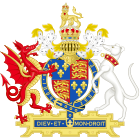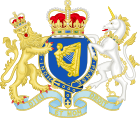Acts of Supremacy facts for kids
The Acts of Supremacy were important laws passed in England during the 1500s. These laws made the English monarch (the King or Queen) the official head of the Church of England. Before these acts, the Pope in Rome was seen as the head of the Church. Similar laws were also passed for the Church of Ireland.
The first Act of Supremacy in 1534 declared King Henry VIII as the "Supreme Head" of the Church. This changed things a lot! Later, this act was cancelled by Queen Mary I. But then, in 1558, Queen Elizabeth I brought back a similar law. She was declared the "Supreme Governor" of the Church, a title the British monarch still holds today. This meant the King or Queen had the highest legal power over the Church in England.
Contents
Understanding the Acts of Supremacy
The Acts of Supremacy were a big deal in English history. They changed who was in charge of the Church in England. Instead of the Pope, the King or Queen became the leader. This is called "royal supremacy." It means the monarch's laws were above the Church's laws.
King Henry VIII and the First Act
| Act of Parliament | |

|
|
| Long title | An Act concerning the King's Highness to be Supreme Head of the Church of England, and to have Authority to reform and redress all Errors, Heresies and Abuses in the same. |
|---|---|
| Citation | 26 Hen. 8. c. 1 |
| Territorial extent | England and Wales |
| Dates | |
| Royal assent | 18 December 1534 |
| Commencement | 3 November 1534 |
| Repealed | 12 November 1554 |
| Other legislation | |
| Repealed by | See of Rome Act 1554 |
| Relates to | Treasons Act 1534 |
|
Status: Repealed
|
|
| Text of statute as originally enacted | |
The first Act of Supremacy was passed on November 3, 1534. It was a key moment in the English Reformation. This act made King Henry VIII of England the "supreme head" of the Church of England.
The law stated that the king was "the only supreme head on Earth of the Church of England." It also said the King would have all the honors and powers related to this role. The Parliament wasn't giving him this title. Instead, they were recognizing what they saw as an existing fact. Henry VIII removed the Pope's authority in England. He declared the English Church independent. He then appointed himself and future monarchs as its supreme rulers. Earlier, in 1521, Pope Leo X had called Henry VIII "Defender of the Faith." This was because Henry wrote against Martin Luther. Parliament later gave this title to the king in 1544.
Why Henry VIII Wanted Change
King Henry VIII had several reasons for this major change. He really wanted a son to take over the throne after him. He wanted to make sure his family line would continue without problems. His wife, Catherine of Aragon, did not have a son who survived.
Henry tried for years to end his marriage to Catherine. He believed God was punishing him for marrying his brother's widow. Even though Henry was close to the Catholic Church, Pope Clement VII refused his request. Catholic rules said a marriage could not be easily ended. Also, Catherine of Aragon's nephew was Emperor Charles V. The Pope did not want to upset such a powerful ruler.
Consequences for Disagreement
After the Act of Supremacy, Henry VIII passed another law. This was the Treasons Act 1534. It said that disagreeing with the Act of Supremacy was a very serious offense. It meant going against the king's new authority. People who did not accept the king as head of the Church faced severe punishment.
A famous person who resisted these new laws was Thomas More. He was found guilty of this serious offense. He faced the consequences for his beliefs.
The Act in Ireland (1537)
| Act of Parliament | |

Parliament of Ireland
|
|
| Long title | An Act authorizing the King, His Heirs, and Successors, to be supreme Head of the Church of Ireland. |
|---|---|
| Citation | 28 Hen. 8. c. 5 (I) |
| Territorial extent | Ireland |
| Dates | |
| Royal assent | 1537 |
| Commencement | 1537 |
| Repealed | 23 May 1950 |
| Other legislation | |
| Repealed by | Statute Law Revision Act 1950 |
| Relates to |
|
|
Status: Repealed
|
|
| Text of statute as originally enacted | |
In 1537, a similar law was passed in Ireland. This was the Act of Supremacy (Ireland) 1537. It made Henry VIII the supreme head of the Church of Ireland. This was just like what had happened in England a few years earlier. Parts of this act were later cancelled for Northern Ireland in 1950.
Queen Elizabeth I and the Second Act
| Act of Parliament | |

|
|
| Long title | An Acte restoring to the Crowne thauncyent Jurisdiction over the State Ecclesiasticall and Spirituall, and abolyshing all Forreine Power repugnaunt to the same. |
|---|---|
| Citation | 1 Eliz. 1. c. 1 |
| Territorial extent | England and Wales |
| Dates | |
| Royal assent | 8 May 1559 |
| Commencement | 23 January 1559 |
| Other legislation | |
| Repeals/revokes | Suppression of Heresy Act 1400 |
| Amended by |
|
| Relates to |
|
|
Status: Amended
|
|
| Text of statute as originally enacted | |
| Revised text of statute as amended | |
| Text of the Acts of Supremacy as in force today (including any amendments) within the United Kingdom, from legislation.gov.uk | |
King Henry VIII's Act of Supremacy was cancelled in 1554. This happened during the rule of his daughter, Queen Mary I. She was a strong Catholic. When she passed away in November 1558, her half-sister Elizabeth I became Queen.
Elizabeth's New Title and Rules
The first Parliament under Queen Elizabeth I passed the Act of Supremacy 1558. This law declared Elizabeth the Supreme Governor of the Church of England. It also created an Oath of Supremacy. This oath required anyone in public or church office to promise loyalty to the monarch. They had to accept the monarch as the head of both the Church and the state. Refusing this oath could lead to serious charges.
Elizabeth used the title Supreme Governor instead of Supreme Head. This helped to calm some Catholics and Protestants. They had concerns about a female leader of the Church. Elizabeth was a practical ruler. She did not punish people who had different religious practices. This was unless their actions directly challenged her authority as monarch. This Second Act of Supremacy officially set up the reformed Church of England. This was part of the Elizabethan Religious Settlement.
The Act in Ireland (1560)
| Act of Parliament | |

Parliament of Ireland
|
|
| Long title | An Act restoring to the Crown, the auncient Jurisdiction over the State Ecclesiasticall and Spirituall, and abolishing all forreine Power repugnaunt to the same. |
|---|---|
| Citation | 2 Eliz. 1. c. 1 (I) |
| Territorial extent | Ireland |
| Dates | |
| Royal assent | 1 February 1560 |
| Commencement | 12 February 1560 |
| Other legislation | |
| Amended by |
|
| Relates to |
|
|
Status: Amended
|
|
| Text of statute as originally enacted | |
| Revised text of statute as amended | |
| Text of the Act of Supremacy (Ireland) 1560 as in force today (including any amendments) within the United Kingdom, from legislation.gov.uk | |
In 1560, the Parliament of Ireland also passed its own Act of Supremacy. This was the Act of Supremacy (Ireland) 1560. It restored the Crown's ancient power over the Church in Ireland. It also removed all foreign power that went against this.
See Also
 In Spanish: Acta de Supremacía para niños
In Spanish: Acta de Supremacía para niños
 | George Robert Carruthers |
 | Patricia Bath |
 | Jan Ernst Matzeliger |
 | Alexander Miles |

